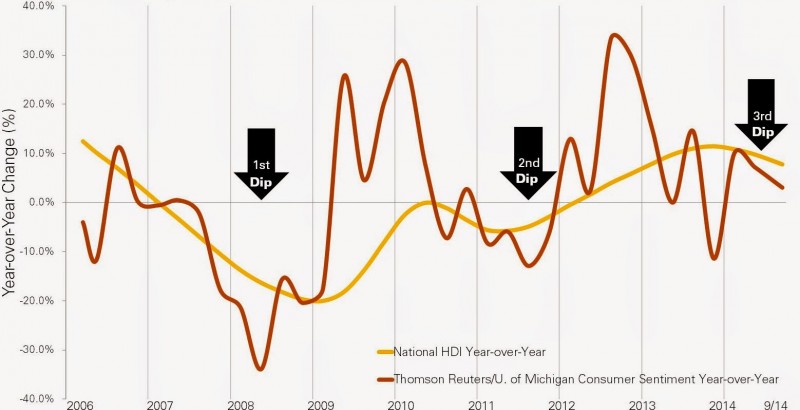The headline for much of this year has been that home price gains are easing. Prices are still higher compared to last year, but not nearly as much as they had been. Now, suddenly, it looks as if home values could actually go negative on a national level.
“That will be the first time collectively, as a nation, we’ve seen prices drop since the low point or the trough of the housing crisis,” said Alex Villacorta, vice president of research and analytics at data firm Clear Capital.
Villacorta points to a 1 percent quarterly home price gain from the second to the third quarter of this year. Last year that quarterly gain was 3 percent.
The headline for much of this year has been that home price gains are easing. Prices are still higher compared to last year, but not nearly as much as they had been. Now, suddenly, it looks as if home values could actually go negative on a national level.
“That will be the first time collectively, as a nation, we’ve seen prices drop since the low point or the trough of the housing crisis,” said Alex Villacorta, vice president of research and analytics at data firm Clear Capital.
Villacorta points to a 1 percent quarterly home price gain from the second to the third quarter of this year. Last year that quarterly gain was 3 percent.
“The discouraging thing about that is, yes, we’re still in the positive, but that 1 percent has been waning from that three percent, and this comes after what should have been the most active buying season in the housing market for the summer that just ended,” he added.
The West, which has some of the largest metropolitan markets in the nation, has seen a huge drop in distressed sales, as fewer properties go to foreclosure. At their peak in 2009, just over half of all sales in the West were of distressed properties; today that share is just over 12 percent, according to Clear Capital. Investors, consequently, are moving on to other markets in the South and Midwest, where there are still bargains to be had. The West is therefore seeing sharper drops in home price appreciation.
“And that is why the West is really that leading indicator, the canary in the coal mine, because as the West goes, both on the downturn and in the recovery,we’ve seen the rest of the country go as well,” said Villacorta.
A report from John Burns Real Estate Consulting ranks much of California in its “overvalued markets” category for September, but still sees continued price appreciation in 2015, albeit at half the rate of 2014.
Over at CoreLogic, which also tracks home prices, economist Mark Fleming is skeptical. “I suppose you can never say never, but realistically there does not seem to be any particularly strong reason why we should see sustained declines in house prices.”
CoreLogic reported home prices nationally in August up 6.4 percent compared with August of 2013. That includes sales of distressed properties. In the summer of 2013, however, price appreciation was about twice that. Fleming says the drop in appreciation is welcome, a sign of a healthier market.
“Many of those Western markets overshot equilibrium by a lot,” said Fleming. “Now we are moving toward things driving the housing market the way they used to.”
Demand, an improving economy, and more jobs. Those should help the housing market improve. They are not, however, helping first time home buyers to be able to afford a home, at least according to Credit Suisse, which reduced its estimates for housing starts accordingly.
“While housing still looks affordable usng conventional assumptions, we see first-time buyer housing costs approaching prior peak levels,” wrote Credit Suisse analysts in a note to investors. “The combination of higher mortgage insurance costs, higher interest rates, and higher home prices have already brought affordability back to the long-term averages for first-time home buyers.”
They say home prices will see just 2 to 3 percent nominal growth in 2015 and 2016, with added risk as interest rates rise.
With affordability no longer a compelling motivator, and consumer confidence in housing weakening, at least according to these analyses, home prices don’t have quite the trajectory some had predicted. Whether they fall into the negative, even briefly and even due to seasonal factors, the impact on the nation’s home builders as well as on potential sellers could be damaging. As for the wider economy, it is unlikely to be able to rely on housing any time soon as a significant driver of growth.
Diana Olick
CNBC Real Estate Reporter

